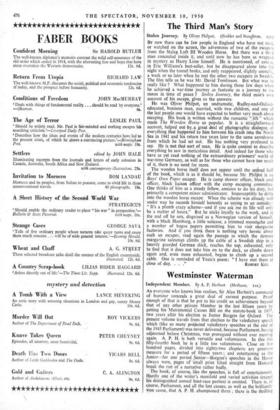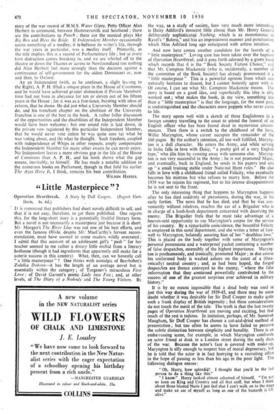Westminster Waterman
Independent Member. By A. P. Herbert (Methuen. 2 is.) As everyone who knows him realises, Sir Alan Herbert's command of humour conceals a great deal of earnest purpose. Proof enough of that is that he put to his credit an achievement beyond that of any other private Member in the last fifteen years by getting his Matrimonial Causes Bill on the statute-book in 1937, two years after his election as Junior Burgess for Oxford. The present volume travels from that election to the Valedictory speech which (like so many projected valedictory speeches at the end of the 1945 Parliament) was never delivered, because Parliament, having adjourned before Christmas, was prorogued without ever meeting again. A. P. H. is both versatile and voluminous. In this (his fifty-fourth) hook he is a little too voluminous. Close on five hundred pages, divided into eighty-two chapters; are generous measure for a period of fifteen years ; and entertaining as the Junior—for one period Senior—Burgess's speeches in the House always were, pages of small print lifted straight from Hansard break the run of a narrative rather badly. The book, of course„ like the speeches, is. full .of entertainment. Hardly one of the writer's manifold and varied activities (except his distinguished annual boat-race parties) is omitted. There is, of course, Parliament, and all the lost causes, as well as the brilliantly won cause, that A. P. H. championed there ; there is the thrilling story of the war record of H.M.S. Water Gipsy, Petty Officer Alan Herbert in command, between Hammersmith and Southend ; there are the contributions to Punch ; there are the musical plays hke Big Ben and Bless the Bride. If Independent Member occasionally seems something of a medley, it ivherause its writer's life, through the war years in particular, was a .medley itself. Primarily, as the title implies, this is a record of Parliamentary life ; but at every turn distraction comes breaking in, and we are whirled off to the Theatre or down the Thames or across to Newfoundland (on nothing did Alan Herbert feel more strongly than the decision against a continuance of self-government for the oldest Dominion) or, now and then, to Oxford.
As an Independent (with, as he confesses, a slight leaning to the Right), A. P. H. filled a unique place in the House of Commons, and he would have achieved greater distinction if Private Members' time had not been in abeyance for ten or eleven out of his fifteen years in the House ; for it was as a free-lance, bursting with ideas of reform, that he shone. He did just what a University Member should do, and his trenchant chapter on the abolition of the University franchise is one of the best in the book. A rather fuller discussion Of the opportunities and the disabilities of the Independent Member would have been welcome ; but one sound rule is laid down, in the private vow registered by this particular Independent Member, that he would never vote unless he-was quite sure (a) what he was voting about, and (b) what he thought. Such freedom, coupled with independence of Whips in other respects, amply compensates the Independefit Member for many other sweets he can never enjoy. No Independent leaves a more obvious gap in the life of the House of Commons than A. P. H., and his book shows what the gap means, inevitably, to himself. He has made a notable addition to the numerous books on Parliament, though in that field his earlier The Ayes Have It, I think, remains his best contribution.
WILSON HARRIS.



















































 Previous page
Previous page